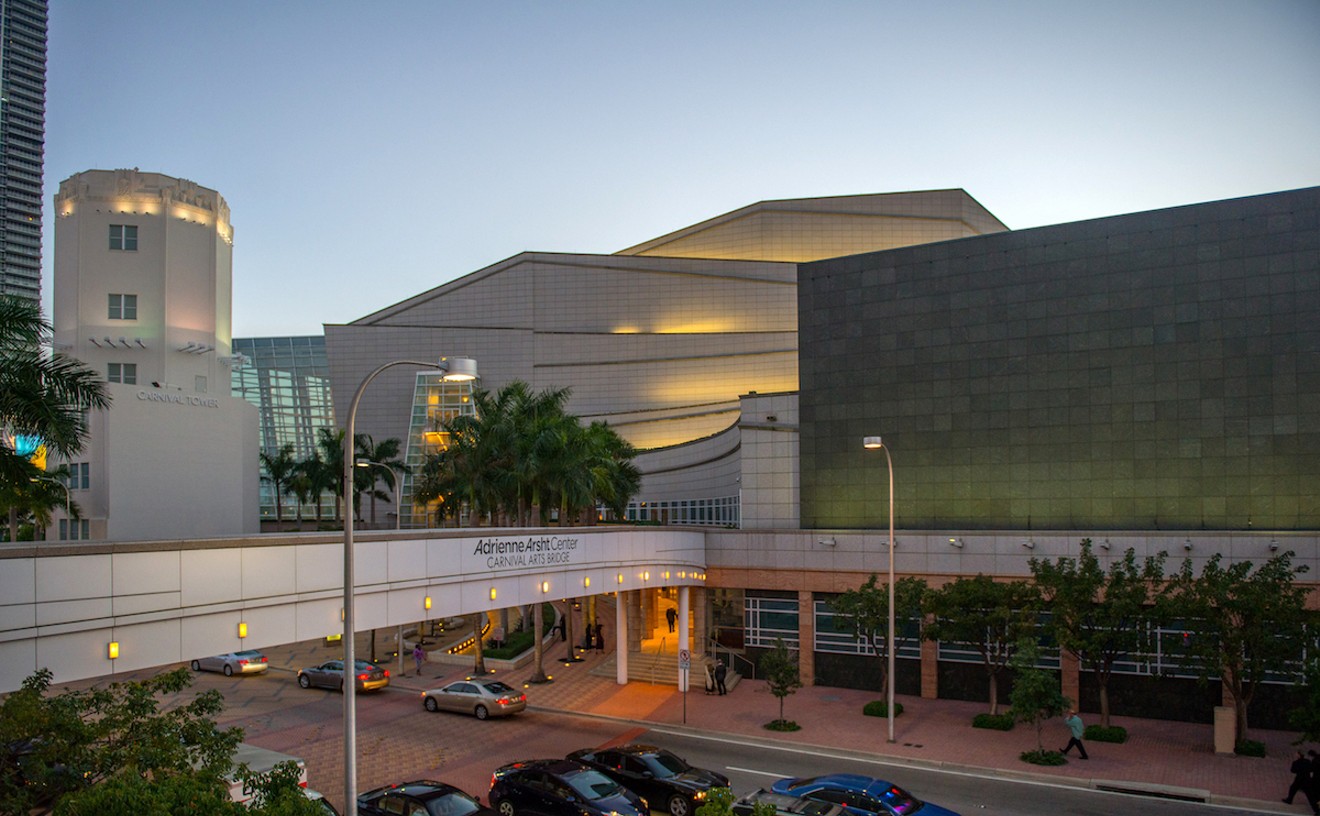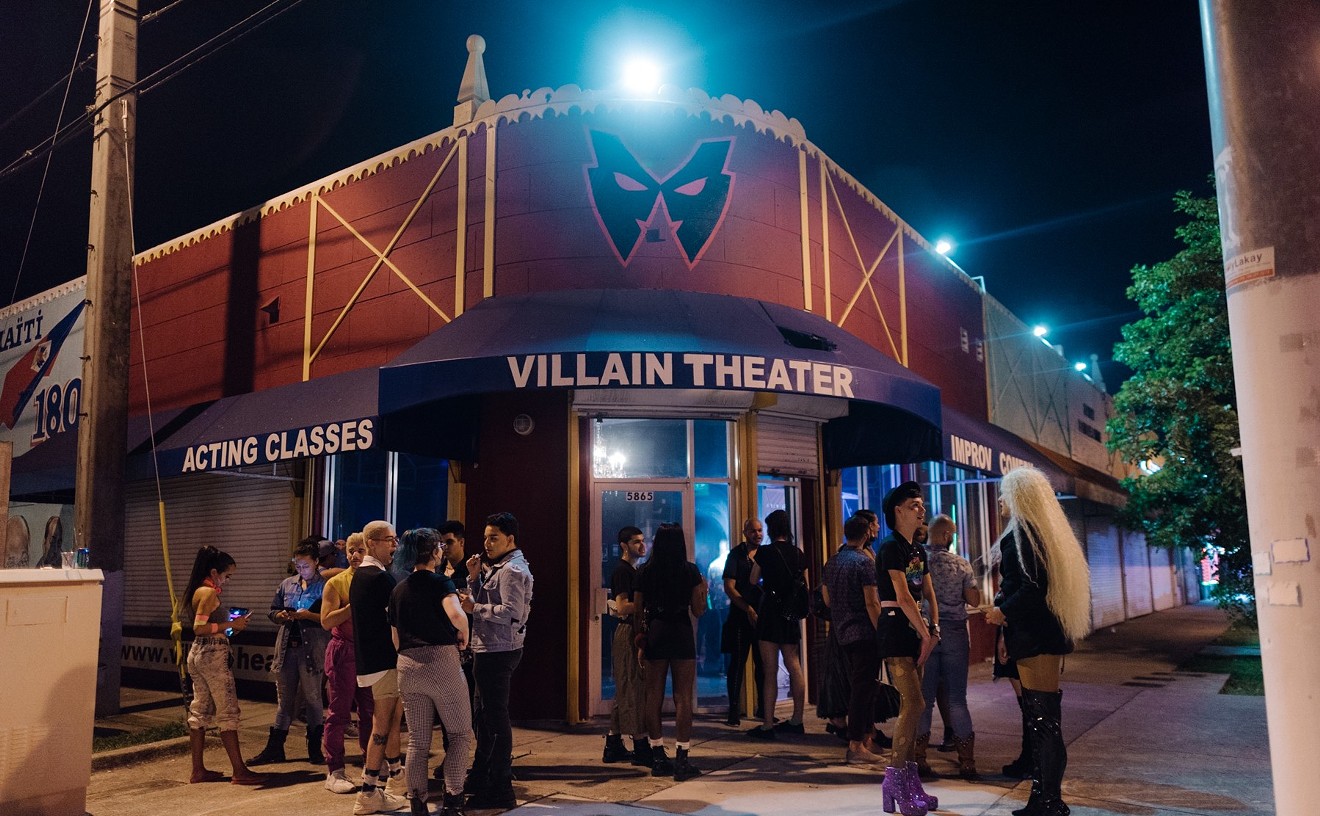Peter Sinn Nachtrieb's Boom is a comedy that tells the story of a straightforward journalism student and an awkward marine biologist whose uncomfortable attempt at casual sex ends up saving their lives. But it also leaves the fate of humanity in their hands (and reproductive organs). The play has been interpreted across the nation to positive reviews, but director Oleg Kheyfets was determined to make this iteration a lively snapshot of present-day Miami. So the Basement Project, a new theater company run by Kheyfets, produced and presented Boom this past January 7 through 23. Aiding the company were local disco-funk favorite Afrobeta, which composed and performed the funky and mysterious soundtrack. The band's vocalist, Cuci Amador, also starred as Barbara,Boom's guiding voice from the future. She explained to the audience how civilization persevered and became an underwater society. In many ways, this is Barbara's story. If this were a Greek tragedy, Barbara would be our chorus, directing us through the various levels of disaster the characters face.
Best New Play
Boom

- 770 NE 125th St., North Miami, 33161 Map
- 305-893-6211
- mocanomi.org
Best Theater
Zoetic Stage

The resident company at the Arsht Center's Carnival Studio Theater cemented its regional dominance this season. With a slate of just three shows, director Stuart Meltzer made each one count, excelling in works that included an edgy world premiere by a South Florida playwright, a brainy rom-com about feminism, and a chamber musical by a national treasure. Meltzer imbued the shows with distinct directorial flourishes. There were jazzed-up, staccato courtroom deliberations in Stripped and an intoxicating moving platform and a gender-bending supporting cast in Passion. The designs for each show reimagined the carnival space, from a blind Lady Justice towering behind the quarreling mortals in Stripped to the ladders of opportunity dangling existentially above the manicured homes in Rapture, Blister, Burn. Then there was the multitiered birthday cake of a set in Passion, reflecting the show's multiple layers. Exceptional acting from a stable of the region's finest professionals made it all look easy, and the well-curated mix of shows ensured that audiences always had plenty to discuss on the car ride home.
Readers' choice: Adrienne Arsht Center for the Performing Arts
- 1300 Biscayne Blvd., Miami, 33132 Map
- 305-949-6722
- arshtcenter.org
Best New Theater
Villain Theater

Jeff Quintana, cofounder of Miami's Villain Theater, woke up on a Central Park bench every morning for two weeks in the dead of New York City's winter. It was 2009, and he had just left Miami to pursue his love of comedy —a passion not readily supported in the Magic City. He was on a mission to learn from some of comedy's greats and then bring that knowledge back home. Last August, Quintana and Peter Mir cofounded the Villain Theater, a microtheater that operates in the back of Made at the Citadel in Little River. The budding playhouse hosts Chicago-style improv, sketch, and standup shows while also offering workshops for aspiring performers. The select improv groups include the all-female Orange Is the New Wack, headed by Jannelys Santos and Sheela Dominguez. It provides a wry take on female inmate culture. Each set lasts an hour, surpassing what most comedy clubs in our city can offer in both quality and quantity.
- 5865 NE Second Ave., Miami, 33137 Map
- 786-391-2241
- villaintheater.com
Best Actress
Lindsey Corey
Lindsey Corey has been an emerging talent for years, displaying range in roles as varied as a roller-skating muse in Slow Burn's Xanadu and a bumptious Southern fundamentalist in Zoetic Stage's The Savannah Disputation. But last November's production of Stripped, also from Zoetic, will be remembered as the role that launched her into the upper tier of South Florida actors. Christopher Demos-Brown's world-premiere play is a quick-witted, emotionally trenchant meditation on parenting in the 21st Century. Its double-entendre title references a character that could slide easily into a cliché — the stripper with a heart, who loves and provides for her child but not in a way that society accepts. Because the role had never been performed outside of a play reading, Corey had no precedent, and her inventive decisions set an impossibly high standard for future productions. Playing a Russian immigrant who moonlights in the sex industry, Corey was alternately sensual and dolorous, vigorous and reflective, funny and heartbreaking, owning her character's accent as comfortably as the wobbly stripper pole at center stage, where she mastered the kind of choreography they don't teach at New World.
Best Actor
Peter Galman
Jennifer Haley's drama The Nether posits a certifiably creepy, uncomfortably plausible near-future in which the internet has evolved into a vivid virtual-reality realm called the Nether. There, users can explore fantasies from the comfort of their recliners. The play pivots on a police investigation into a lurid usage of the Nether by a man named Sims, who created a pedophilic pleasure garden. Sims' Peter Galman anchored Area Stage's unsettling production. He played his "offline" self, combating an interrogation in a spartan police station with unctuous evasiveness and his online avatar, a foppishly dressed proprietor of degenerate escapism. By offering both a cunning manipulator and a diseased man, Galman achieved a remarkable feat: He convinced the play's audience that Sims' virtual vileness had a preventive merit in the real world. Even if you think you hated everything he stood for, he was spellbinding enough to win every debate. If prison weren't possibly in his future, perhaps politics could be.
Best Supporting Actress
Lourelene Snedeker
Each character in Terrence McNally's inside-theater homage It's Only a Play is a target for the playwright's relentless barrage of satirical darts — a pretentious British director, an empty-headed producer, a hygiene-challenged critic, and others. They all gather in a New York City townhouse to await the merciless overnight reviews of a budding playwright's Broadway debut. GableStage's expertly paced, imaginatively cast production featured one of the season's best ensembles, but Lourelene Snedeker was the brightest bulb in its marquee. She portrayed McNally's interpretation of another sturdy theatrical archetype, the diva with a drug habit and an ankle bracelet; she showed a perfect combination of regality, crudeness, and haughty showbiz derision. Though McNally's play is a comedy, Snedeker found something tragic in her character's frequent white-powder escapes from reality. By the time she asserted, in her brief Act II soliloquy, "I'm going to go down there and look every one of those motherfuckers in the face... I'm an actress, a damn good one," she had found the kind of fire, pathos, and emotional hurt that didn't seem to exist on the page.
Best Supporting Actor
Christian Vandepas
In A Minister's Wife, GableStage's musical comedy of manners, mores, and marriage at the turn of the 19th Century, Christian Vandepas played the show's unorthodox disrupter: a shy, retiring poet named Eugene Marchbanks, who falls madly in love with Laura Hodos' title character. Fighting her blustery husband (Jim Ballard) for her cosseted affections, Vandepas embodied Marchbanks as the sensitive beta to Ballard's barrel-chested alpha male. Conjuring, at first, the sort of awkward loners Crispin Glover used to play in cult movies, Vandepas's contribution deepened along with Marchbanks' love. It was a performance of smitten effervescence, a catalog of reverential gazes and lost-puppy affectation, commanding our attention even when he wasn't saying anything. More than anyone else onstage, he transcended the show's problematic operetta parts, which often felt like they were intruding on a great play. He may have been the naive boy to Ballard's towering man, but music proved the gateway to this poet's romantic soul. Audiences left the theater a little lovelier after hearing him reveal it.
Best Ensemble Cast
Rapture, Blister, Burn

Watching Zoetic Stage's sportive Rapture, Blister, Burn felt like auditing a semester in Post-Feminist Theory. If that sounds dense, dull, and white-paperish, it wasn't. In fact, it was funny, revealing, and intellectually raucous. The cast was perfectly chosen to personify their generations, genders, and viewpoints. There was Mia Matthews as Catherine, a statuesque writer of impenetrable feminist tomes with a rocky romantic past; Margery Lowe played her ex-roommate, now unhappily married to Catherine's former lover; Todd Allen Durkin (or Stephen G. Anthony) portrayed that divisive man, who has settled into a middle age of beer bellies and creative rigor mortis; Barbara Bradshaw played Catherine's spunky mother; and Lexi Langs was a jaded millennial who enrolls in Catherine's summer feminist seminar. They formed a clashing Hydra of opinions on topics spanning from Phyllis Schlafly to porn addiction and horror movies. A marriage imploded and was reconstructed as the play meandered to its denouement, but it was the cast's impressive verbal jousting that kept this potentially dry production whip-smart. It would have made Betty Friedan proud — when it wasn't driving her crazy.
- 1300 Biscayne Blvd., Miami, 33132 Map
- 305-949-6722
- arshtcenter.org
Best Set Designers
Gene Seyffer and Jodi Dellaventura

For Actors' Playhouse's production of The Toxic Avenger: The Musical, Gene Seyffer and Jodi Dellaventura were tasked with envisioning a New Jersey cityscape overwhelmed by garbage. Tempting as it would have been to simply use Google Earth images of Newark, designers instead developed a unique presentation of a radioactive dystopia that brought to mind graphic novels. You wanted a shower after just looking at it. But there was more to the precise arrangements of leaking toxic vats than met the eye. Each hazardous container ended up transforming smoothly into another object in a future scene. There was the desk in the corrupt mayor's office, the Toxic Avenger's couch, and the bedroom furniture of his beloved blind damsel. Then there was the immaculately gross tower of trash at center stage, to which an audience member on opening weekend added her own discarded wine cup — a decision that, in its highly offensive way, complemented the designers on their authenticity.
- 280 Miracle Mile, Coral Gables, 33134 Map
- 305-444-9293
- actorsplayhouse.org
Best Comedy Venue
Shirley's at Gramps

Some comedy venues ask that revelers stick to a two-drink minimum. But visitors to Gramps' monthly showcase, Late-Nite Comedy, are lucky if they can leave standing up. That's an exaggeration, but honestly, what better place is there for locals to cut their teeth in comedy than in front of a dive-bar crowd? Every last Tuesday of the month, drinkers warm up at happy hour and file into Shirley's back room for standup that runs the gamut from laugh-out-loud to totally avant-garde. It's a rad scene, something fresh and hot in South Florida. It's so hot, in fact, that it inspired Hannibal Buress to hang around and perform a surprise set the next day. Quincy Jones used the venue to deliver an uproarious good time. So Shirley's continues to expand in the funny direction. It's warm and inviting, and with a capacity of about 100 standing, it offers the chance for once-in-a-lifetime intimate comic experiences. Just try not to heckle. They'll totally kick you out.
- 176 NW 24th St., Miami, 33137 Map
- 305-699-2669
- www.gramps.com





